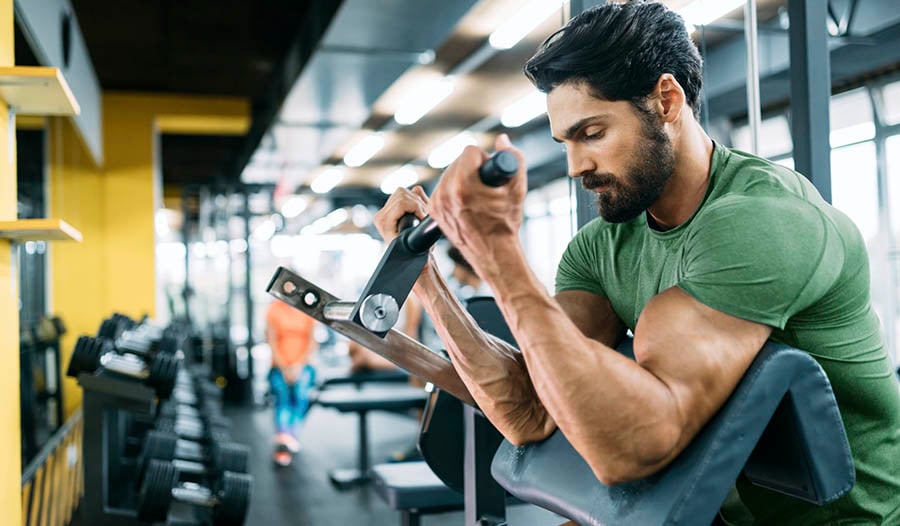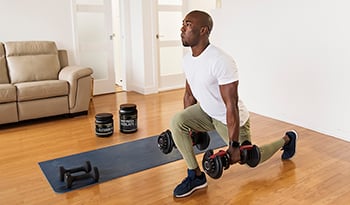补充肌酸的综合指南
免责声明:本博客不提供诊断⋯

作者:Joshua Nackenson医生
肌酸是天然的物质,主要存在于肌肉细胞中。它是通过膳食获取的,主要是肉类和海鲜;有一小部分则是由人体产生的。如果没有任何补充,肌肉存储的肌酸通常约为60-80%的饱和度。由于素食者饮食中并无显著的肌酸来源,肌肉储存量基线往往更低,因此受益于补充的程度更大。肌酸的主要功能是补充三磷酸腺苷(ATP)的存量,ATP是用于细胞内能量的分子。在短暂的剧烈运动中,快速再生ATP的能力有一部分是取决于肌肉中的肌酸酐含量。
自20世纪80年代以来,肌酸一直受到广泛研究,发表的研究报告超过1000份。补充肌酸对表现的主要裨益,是提高在健身房和运动场上的能力。关于提升表现的研究大多数都发现,在高强度练习中约有10-20%的改善。例如,在一项对受过阻力训练的男性进行的研究中,摄取肌酸的组别平均能够在五组卧推中多做1-2次(练到极限次数)。虽然多做1-2次可能看起来不是很多,但经过一段时间,能够多做10-20%的次数可增加肌肉建设和力量。
肌酸是否适合所有人?
肌酸主要是对男性进行研究,但大多数女性的研究看来都显示出类似的益处。事实上,一些研究甚至表明,女性对肌酸的反应比男性更大。此外,老年人肌酸补充有广泛的研究,也有类似的结果。遗憾的是,肌酸的影响似乎并非对所有人都一样──不同的人对肌酸的反应也有异,有些人的表现几乎完全没有改善,有些人则有明显的改善。虽然有些人可能没有那么强烈的反应,肌酸还是可值得一试。它被认为是提高运动能力和帮助建立肌肉的最有效补充剂。
是否安全?
肌酸是被研究得最多的表现提升补充剂之一,拥有超过30年的数据,其安全性有大量证据支持。曾有一些报告指肌酸可引起脱水和肌肉痉挛,但最好的研究并未显示有这些情况。 此外,有一种误解是肌酸可能会伤肾。对不同群体从年轻健康者到老年病患者的短期和长期研究,均未显示出任何负面影响。
有副作用吗?
在所有研究中一致的唯一的副作用是会有少许的体重增加,主要是由于肌肉内的水分潴留增加。不是每个人都会在摄入肌酸后增加体重,但大多数研究显示,体重75公斤左右的人平均增重略超过1公斤,范围从1公斤至 3公斤。
如何摄取肌酸?
肌酸有多种配方,最便宜、最受欢迎而且被研究得最多的是一水肌酸。一水肌酸通常以丸剂和粉剂形态提供,效力相当。肌肉的肌酸储存必须处于饱和状态,肌酸才能发挥效果。服用肌酸时有两种选择:冲击期和非冲击期。
- 冲击期:每公斤体重摄入0.3克,服用5-7天,然后每天5克。冲击期让一个人的肌肉肌酸储存在约一周内达到饱和状态,并开始看到结果。冲击期的缺点是每天需要摄入大量肌酸。尽管一些最稳健的研究并无一致显示有肠胃不适,但一项研究表明,当服用每份多于5克的剂量时,肠胃不适更为普遍。
- 非冲击期:每天服用5克。通常需要约3-4周,肌肉肌酸储存才达到饱和状态。要有耐心。
常有人讨论肌酸在训练期间的补充时机,然而于何时摄取肌酸可获得最大效益,并没有很强的科学论证。大多数研究并无强调摄入肌酸的时间。一项对老年人进行的小规模研究显示,在锻炼前和锻炼后摄入肌酸,效果没有差异;而另一项对年轻的健美运动爱好者进行的小型研究显示,身体成分和卧推重复次数的最大重量(RM)略有改善。如果你通常在锻炼后喝一杯蛋白质奶昔,不妨加入肌酸以获得潜在的益处,但如果你在锻炼之前摄取,也是没有问题的。
咖啡因等补充剂会使人体产生耐受性,效果会随着时间减弱,肌酸则不同,效果是持续的,不需要停服再继续。
一些人主张同时摄入肌酸和大量碳水化合物,以提高吸收和肌肉中的肌酸总储存量。确实,碳水化合物有助肌酸进入肌肉,然而还没有研究表明这种策略对表现有帮助。
除一水肌酸外,还有其他形态的肌酸,如盐酸肌酸(HCl)和肌酸乙酯(CEE)。这些肌酸是否优于一水肌酸,目前并无科学文献支持。盐酸肌酸的主要优点是更容易溶于水,不过价格较高。一些人声称,盐酸肌酸所需的总剂量比一水肌酸为低,但尚未有这方面的研究。另一方面,肌酸乙酯效果似乎与安慰剂相同,看来不如一水肌酸有效。
总结一下,肌酸是安全、高度有效和便宜的。每天服用肌酸......这是医嘱!
参考文献:
- Brosnan ME, Brosnan JT. The role of dietary creatine. Amino Acids. 2016;48(8):1785-1791.
- Kreider RB, Kalman DS, Antonio J, et al. International society of sports nutrition position stand : Safety and efficacy of creatine supplementation in exercise , sport , and medicine. . 2017:1-18.
- Burke DG, Chilibeck PD, Parise G, Candow DG, Mahoney D, Tarnopolsky M. Effect of creatine and weight training on muscle creatine and performance in vegetarians. Medicine and science in sports and exercise. 2003;35(11):1946-55.
- Kreider RB. Effects of creatine supplementation on performance and training adaptations. Molecular and Cellular Biochemistry. 2003;244(1-2):89-94.
- Volek JS, Kraemer WJ, Bush Ja, et al. Creatine supplementation enhances muscular performance during high-intensity resistance exercise. Journal of the American Dietetic Association. 1997;97(7):765-770.
- Kresta JY, Oliver JM, Jagim AR, et al. Effects of 28 days of beta-alanine and creatine supplementation on muscle carnosine, body composition and exercise performance in recreationally active females. Journal of the International Society of Sports Nutrition. 2014;11(1):55.
- Larson-Meyer DE, Hunter GR, Trowbridge CA, et al. The effect of creatine supplementation on muscle strength and body composition during off-season training in female soccer players. Journal of Strength and Conditioning Research. 2000;14(4):434-442.
- Vandenberghe K, Goris M, Van Hecke P, Van Leemputte M, Vangerven L, Hespel P. Long-term creatine intake is beneficial to muscle performance during resistance training. Journal of applied physiology. 1997;83(6):2055-63.
- Branch JD. Effect of creatine supplementation on body composition and performance: A meta-analysis. International Journal of Sport Nutrition and Exercise Metabolism. 2003;13(2):198-226.
- Chilibeck PD, Kaviani M, Candow DG, Zello GA. Effect of creatine supplementation during resistance training on lean tissue mass and muscular strength in older adults: A meta-analysis. Open access journal of sports medicine. 2017;8:213-226.
- Syrotuik DG, Bell GJ. Acute creatine monohydrate supplementation: A descriptive physiological profile of responders vs. nonresponders. Journal of Strength and Conditioning Research. 2004;18(3):610-617.
- Kreider RB, Kalman DS, Antonio J, et al. International society of sports nutrition position stand: Safety and efficacy of creatine supplementation in exercise, sport, and medicine. Journal of the International Society of Sports Nutrition. 2017;14(1):1-18.
- Gualano B, Ugrinowitsch C, Novaes RB, et al. Effects of creatine supplementation on renal function: A randomized, double-blind, placebo-controlled clinical trial. European journal of applied physiology. 2008;103(1):33-40.
- Groeneveld GJ, Veldink JH, van der Tweel I, et al. A randomized sequential trial of creatine in amyotrophic lateral sclerosis. Annals of neurology. 2003;53(4):437-45.
- Neves M, Gualano B, Roschel H, et al. Effect of creatine supplementation on measured glomerular filtration rate in postmenopausal women. Applied physiology, nutrition, and metabolism = Physiologie appliquee, nutrition et metabolisme. 2011;36(3):419-22.
- Powers ME, Arnold BL, Weltman AL, et al. Creatine supplementation increases total body water without altering fluid distribution. Journal of Athletic Training. 2003;38(1):44-50.
- Demant T, Rhodes E. Effects of creatine supplementation on exercise performance. Sports Medicine. 1999;28(1):49-60.
- Ostojic SM, Ahmetovic Z. Gastrointestinal distress after creatine supplementation in athletes: Are side effects dose dependent? Research in Sports Medicine. 2008;16(1):15-22.
- Candow DG, Zello GA, Ling B, et al. Comparison of creatine supplementation before versus after supervised resistance training in healthy older adults. Research in sports medicine (Print). 2014;22(1):61-74.
- Antonio J, Ciccone V. The effects of pre versus post workout supplementation of creatine monohydrate on body composition and strength. Journal of the International Society of Sports Nutrition. 2013;10:1-8.
- Steenge GR, Simpson EJ, Greenhaff PL. Protein- and carbohydrate-induced augmentation of whole body creatine retention in humans. Journal of applied physiology 2000;89(3):1165-71.
- Green AL, Hultman E, Macdonald IA, Sewell DA, Greenhaff PL. Carbohydrate ingestion augments skeletal muscle creatine accumulation during creatine supplementation in humans. The American journal of physiology. 1996
- Jäger R, Purpura M, Shao A, Inoue T, Kreider RB. Analysis of the efficacy, safety, and regulatory status of novel forms of creatine. Amino acids. 2011;40(5):1369-1383.
- Spillane M, Schoch R, Cooke M, et al. The effects of creatine ethyl ester supplementation combined with heavy resistance training on body composition, muscle performance, and serum and muscle creatine levels. Journal of the International Society of Sports Nutrition. 2009;6:1-14.

 作者 Dr. Joshua Nackenson, M.D.
作者 Dr. Joshua Nackenson, M.D.


